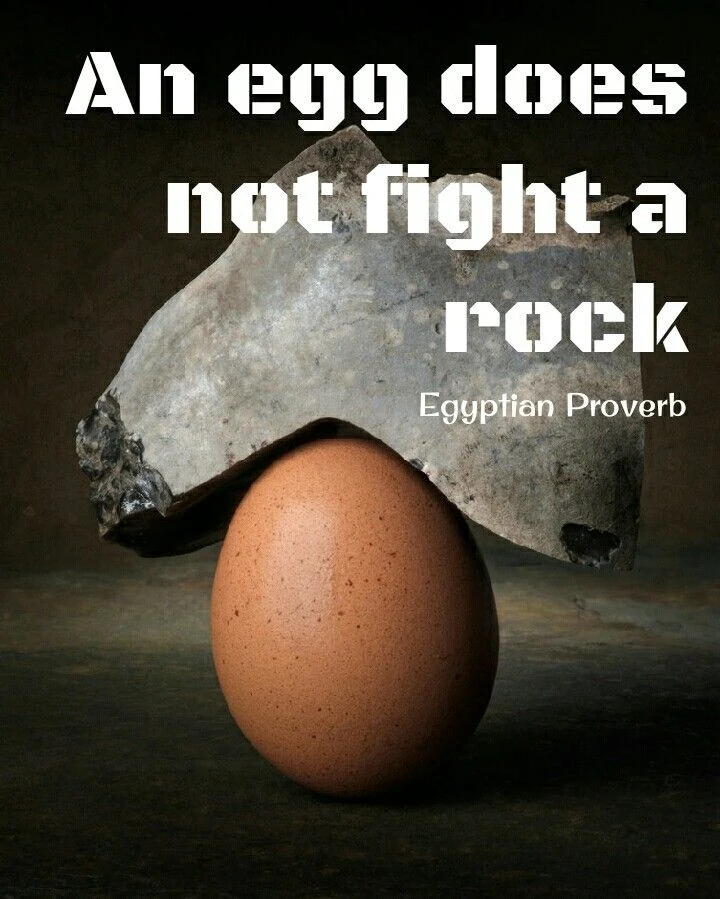When you are weaker than your opponent, there is nothing to be gained by fighting a useless fight. Know how to pick your battles. Fighting a loss fight gives you nothing to gain but pain and martyrdom, and, in the process, a lot of people who do not believe in your fight, who do not believe in your cause will be injured, and possibly even die. Weakness is not a sin and can even become a strength if you master the art of playing it right. Fortunes changes and the mightiest of the mightiest are often brought down. In appropriate times and circumstances, playing the card of “surrender” may conceal great power. Playing the surrender card often lull your opponent into complacency. It provides you the time to recoup, time to undermine and time to plan your revenge. Never sacrifice that time in exchange for honor in a battle that you cannot win.
Keep this in mind: People trying to make a show of their authority are easily deceived by the surrender strategy. Your outward sign of submission makes them feel important. Satisfied that you respect them, they become easier targets for a later counterattack. Measuring your power overtime, never sacrifice long-term maneuverability for the short-lived glories of martyrdom.
What gets us into trouble in the realm of success, power and quest for influence is often our own overreaction to the moves of our rivals. That overreaction creates problems we would have avoided have we been more reasonable. It also has an endless rebound effect, for our rivals to respond by overreacting as well. It is often our first instinct to react, to meet aggression with some kind of aggression. The next time it happens to you, try something different: Try not to resist, not to fight back, but to turn the other cheek and bend. You may be surprised to find this often neutralizes the aggressive behavior of your opponents; they expected you, even wanted you to react with force and they are now caught off-guard and confounded by your lack of resistance. You are now in control of the situation because your surrender is part of a larger plan to lull your opponent into believing he has defeated you.
This is the essence of the surrender strategy: Inwardly you stay firm, but outwardly you bend. Deprived of a reason to get angry, your opponent will often be bewildered, unlikely to react with more violence, which would, again, demand a reaction from you. Instead, you are allowed the time and space to plan your countermoves that will bring your opponent down. In the battle of the intelligent against the brutal and the aggressive, the surrender strategy is the supreme weapon. The surrender strategy requires self-control and duplicity. Those who genuinely surrender are giving up their freedom and may be irremediably crushed by the humiliation of their defeat. What you want to do is: To only appear to surrender, to make believe, to play dead for a while only to come back stronger later on.
Yes, indeed, in certain circumstances, it can be better to surrender than to fight. Faced with a more powerful opponent and a sure defeat, it is often also better to surrender than facing a defeat or having to run away. Running away is never an option. Running away may save you for the time being, but your opponent will eventually catch up with you. If you surrender, instead, you are creating an opportunity to coil around your opponent and, in due time, to strike all fangs out from close up.
The point of surrendering is to save your hide for a later date when you can reassert yourself.
Michel Ouellette JMD, ll.l., ll.m.
Systemic Strategic Planning / Regulatory Compliance / Crisis & Reputation Management
Skype: jmdlive
Phone: 1. 613.539.1793
Email: jmdlive@live.ca
Web: https://www.jmdlive.info/
Michel Ouellette / J. Michael Dennis is a Former Attorney, a Trial Scientist, a Crisis & Reputation Management Expert, a Public Affairs & Corporate Communications Specialist, a Warrior for Common Sense and Free Speech.
Follow JMDlive on:
Twitter, LinkedIn, Facebook, Mastodon, Tumblr, JMDlive.com, Instagram and JMD Systemics,

